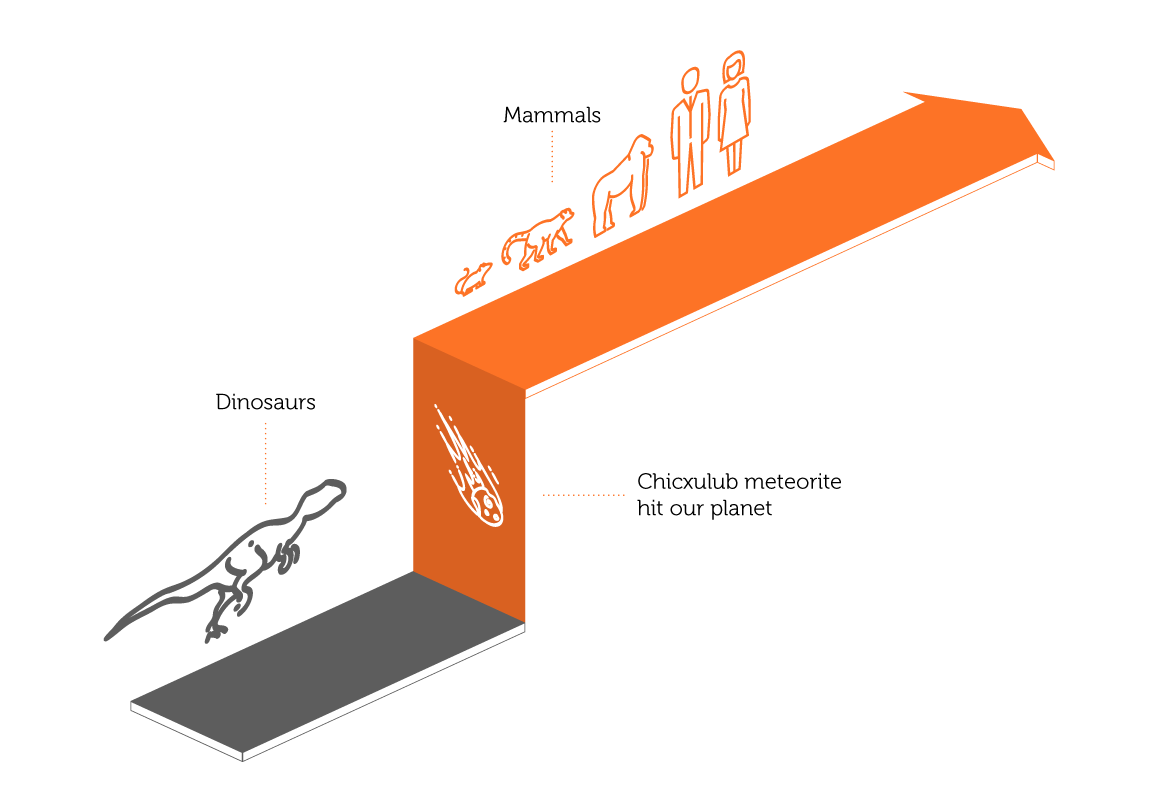Digital – The New Normal
Roughly 66 million years ago, dinosaurs dominated all important ecological areas of the Earth. Yes, there also were the first mammals – small animals no larger than a rat that would be the ancestors of modern-day horses.

Then, around the time that the Chicxulub meteorite hit our planet, most species suffered extinction – almost no animal with a weight of over 25 kilograms survived. Small mammals, however, fared much better. They had fur to protect them from the changing temperature, the placenta enabled the next generation to grow inside the safety of their mother’s body, and finally, they were not overly specialized with regard to the food which they ate. The rest is history. Mammals now rule the world and have developed an incredible diversity of variants from the blue whale to the bumblebee bat – and us (the human race).

From an insignificant beginning to world dominance
Making the effects of the crisis sustainable
It would appear that big is not always the basis for competitive advantage and strength can dwindle under the impact of crisis, while innovation and flexibility lead to success. If this is the general lesson to be learned, what about the potential impact of the corona crisis on our way of work? Today, we are living through that impact – more people working from home, fewer physical meetings, no in-person conferences, less travel – but how can we make the outcomes of this crisis sustainable? And yes, we will need to ensure there is a sustainable impact with the next crisis already at our doorstep – climate change.
Working methods before the crisis
Let me list some facts regarding our pre-crisis way of working:
- People are crowded into office buildings and allocated cubicles. At the same time, an average of 37% of all office space around the world is empty every workday.
- We maintain huge, prestigious meeting rooms that are heated and cleaned – but rarely get beyond 50% utilization during working hours – which means they are empty 85% of the time.
- We hold important meetings in head offices or in London, New York, and Singapore – business travel spend is growing 2-3 times faster than GDP growth.
- On average, people in the USA spend 79 minutes per day commuting to work (in Germany it is 60, in Israel 97 minutes).
- We hold large meetings where one person presents to dozens or even hundreds of people.
- We bring people together from all corners of our countries to train them in a classroom setting on how to use software – although we have known since Ebbinghaus’ first publication in 1885 that 66% of all formal learning content will be forgotten after just a single day.
- Companies outsource the design and documentation of processes to external consultants, with their Subject Matter Experts locked into passivity.
- While companies delegate the process design process, implementation is moved into shared service operations in low-cost countries where people have no emotional connection to the business, its employees, or its customers.
The future of work
These practices, to me, fit with the dinosaur extinction analogy – large but ineffective in this moment of crisis. Offices are empty, planes are grounded and roads are empty. But fortunately (for us) the “mammals” are already here. They may appear insignificant and be rarely sighted, but they may in fact have the potential to define the future of work:
- Let me start with “working from home”. While the benefits are obvious – 1 hour saved every day, no office expenses, less pollution, etc., currently only ~ 8% of all eligible hours are worked from home. Some 75% of all German office workers are able to work from home, but only 50% of employers have the technology ready to implement that, and only 26% have policies in place to enable this practice.
- More and more meetings are being held virtually – the quality varies and we try to run them like traditional meetings.
- The virtual classroom is increasingly replacing on-site training, but it is seen as an expense to be minimized, when the focus should be on improving the learning impact.
- Corporate wikis, intranet portals (SharePoint), and Learning Management Systems (LMS) allow direct employee access to knowledge. However, the use of these is still cumbersome, with poor content governance. The net effect is that the user experience is diminished, which further perpetuates the problem and reinforces the belief that corporate technology does not support employees.
But it is not all bad news. Reassuringly, more and more companies are using technologies that help people to collaborate and support their independence.
Driving change
I am convinced that this crisis will cause these themes to evolve into the work of the future. As thought leaders and evangelists for change, we see the future evolving along the following lines with the decisions outlined below being necessary to pivot these evolutionary practices:
- We should allow our teams to significantly expand the proportion of work done from home or wherever they are. They can save the commuting time (more productivity) and your company can reduce its real estate footprint. Sounds easy enough, but there are some caveats to this decision:
- Communication technology becomes imperative for supporting all aspects of distributed work and enabling employees to become proficient remote workers.
- Employees need direct knowledge access in their working context. The experienced colleague from two desks away may no longer be available. 5 moments of need is a strong concept describing this imperative, and with the tt performance suite, technology is available that allows knowledge access out of a single source for any IT and/or non-IT context.
- Subject Matter Experts (SME) need to be enabled to create, curate and distribute knowledge relevant to communities in their domain of expertise (in real time). Domains such as the opportunity management process in sales, purchase order processing in accounting or development activities in engineering need to be managed by SMEs in a fully compliant and professional way
- Leaders need to develop the skills to manage and coordinate distributed teams. If somebody falls silent in a web session you may not recognize this – is he dozing, is he working on e-mails? How do you approach these questions?
- We need to exploit the potential of “soft” virtual formats that allow for creativity and emotional engagement. I know many managers who consider Lego Serious Gaming or Working out Loud sessions as a waste of time. Research, however, confirms the importance of these formats – especially for the part of our work that is not going to be replaced by RPA / AI anytime soon.
- Learning will become much more important, as the transfer of experience may become more difficult, while at the same time the knowledge required will change more quickly in an agile economy. A truly blended learning approach combines digital learning and a virtual classroom (including practical exercises) – these two are delivered through an LMS with a portal for direct access. They are complemented by a holistic performance support solution that brings digital content (step by step guides, documentation, simulations, and everything else that is relevant) directly into the working context. It is the employee who decides what needs to be learned / accessed to carry out the job activities.
- Employee Self-Service is a paradigm for learning and knowledge access. Classroom training in the conventional sense will fade out. If people meet, it will be for new ideas, coordination and teambuilding.
On the road to success
While these imperatives may sound heavy and maybe a bit theoretical, there are examples that prove the concept as a whole is working:
- Continental – one of the leading automotive suppliers, with 230,000 employees – has created a digital workplace where the single point of truth paradigm is fully realized for many applications and now also in the context of lean/6-sigma initiatives in production.
Read more - Schwarz Group – one of the largest retailers of the world with over 440,000 employees – has created a technology platform that allows the company to conquer international markets with superior employee competence being a key differentiator in the marketplace.
Read more - REWE – a major grocery retailer with 220,000 employees – has not only digitalized workplaces for office staff but also brought digital knowledge about processes and products to shop floor teams, thus winning the HR excellence award.
Reade more - Wacker, a chemical company with 17,000 employees, has equipped its sales team with a smart “everything you need to know” product configurator that brings ultimate competence to the point and moment of application.
The crisis as an opportunity
If our companies do not want to share the fate of the dinosaurs, but rather thrive in the new digitalized and eco-friendly world, we need to act quickly and decisively. The technical and organizational foundations are available, but to make them work for your business model, a clear agenda needs to be developed and followed through – and here again, coronavirus may provide the perfect opportunity for sharpening the ax.




